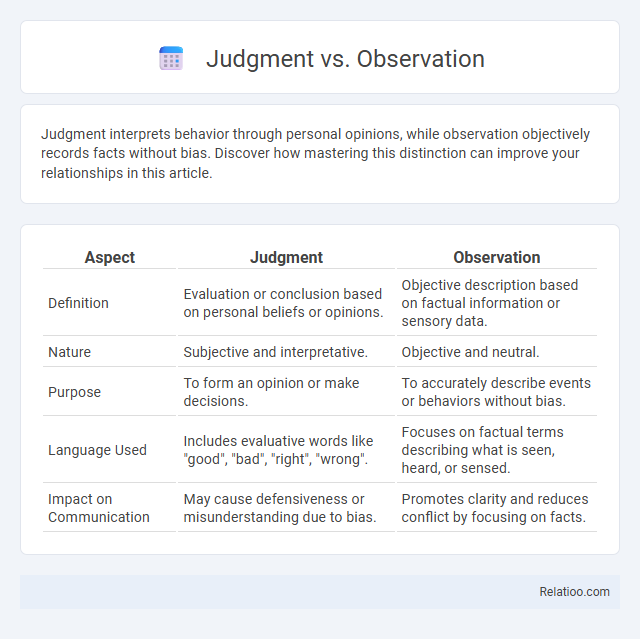Judgment interprets behavior through personal opinions, while observation objectively records facts without bias. Discover how mastering this distinction can improve your relationships in this article.
Table of Comparison
| Aspect | Judgment | Observation |
|---|---|---|
| Definition | Evaluation or conclusion based on personal beliefs or opinions. | Objective description based on factual information or sensory data. |
| Nature | Subjective and interpretative. | Objective and neutral. |
| Purpose | To form an opinion or make decisions. | To accurately describe events or behaviors without bias. |
| Language Used | Includes evaluative words like "good", "bad", "right", "wrong". | Focuses on factual terms describing what is seen, heard, or sensed. |
| Impact on Communication | May cause defensiveness or misunderstanding due to bias. | Promotes clarity and reduces conflict by focusing on facts. |
Understanding Judgment and Observation
Judgment involves forming opinions or conclusions about people or situations, often based on personal values or beliefs, while observation refers to the neutral act of noticing facts or behaviors without attaching interpretation. Understanding judgment requires recognizing the influence of biases and emotions that shape subjective assessments, whereas observation centers on objective and unbiased data collection. Distinguishing between these processes enhances emotional intelligence and interpersonal communication by fostering clarity and reducing misinterpretations.
Defining Judgment: What Does It Mean?
Judgment refers to forming an opinion or conclusion about someone or something based on personal beliefs, values, or experiences. Unlike objective observation, which relies on unbiased facts, judgment often incorporates subjective evaluations that can lead to disapproval or criticism. Understanding judgment helps You recognize how personal biases influence perceptions and interactions with others.
Observation Explained: A Closer Look
Observation involves neutrally noting facts and behaviors without attaching personal opinions or emotions, serving as a key skill in effective communication and conflict resolution. Unlike judgment, which assigns value and often leads to bias, observation focuses solely on what can be seen or heard, providing clear, objective information for analysis. Disapproval introduces subjective negative evaluations, whereas observation remains detached, fostering understanding and reducing misunderstandings.
Key Differences Between Judgment and Observation
Judgment involves forming opinions about someone or something based on personal values, often implying criticism or approval, while observation refers to objectively noticing facts or behaviors without attaching personal evaluation. The key difference lies in judgment's subjective nature, which can lead to bias, whereas observation aims for neutral, unbiased awareness. Understanding this distinction enhances clear communication and reduces misunderstandings in interpersonal interactions.
The Impact of Judgment on Perception
Judgment often skews your perception by filtering experiences through personal biases, distorting reality into subjective interpretations. Observation involves a neutral and objective acknowledgment of facts, fostering clarity and understanding without emotional interference. Disapproval, rooted in judgment, can lead to negative assumptions that hinder open communication and personal growth.
Benefits of Practicing Observation Over Judgment
Practicing observation over judgment enhances emotional intelligence by promoting non-reactive awareness and reducing bias in interpersonal interactions. This approach fosters clearer perception and empathy, enabling more effective problem-solving and communication without the distortions caused by preconceived judgments. Emphasizing observation cultivates mindfulness and objectivity, which are crucial for personal growth and healthier relationships.
How Judgment Shapes Our Interactions
Judgment influences our interactions by creating biases that shape perceptions and responses, often leading to misunderstandings or conflicts. Observation allows for neutral assessment, promoting empathy and clearer communication by focusing on facts rather than personal evaluations. Disapproval conveys negative evaluation but is less pervasive than judgment, which can subtly affect relationships and inhibit open dialogue.
Techniques to Enhance Observation Skills
Techniques to enhance observation skills involve honing sensory awareness, practicing mindfulness, and engaging in active listening to gather unbiased information accurately. Focusing on objective details without judgment allows you to distinguish between pure observation and personal disapproval, leading to clearer, more effective communication. Consistent exercises like journaling specific observations and seeking feedback improve your ability to perceive situations factually and without emotional distortion.
Common Pitfalls of Judgmental Thinking
Judgmental thinking often leads to unfair conclusions that ignore the complexity of situations, causing unnecessary conflict and misunderstanding. Mistaking observation for judgment can distort facts, while disapproval may stem from subjective biases rather than objective analysis. You can improve relationships and decision-making by recognizing these pitfalls and practicing nonjudgmental awareness.
Cultivating Mindfulness Through Observation
Cultivating mindfulness through observation involves consciously noticing your thoughts and feelings without attaching judgment or disapproval. By distinguishing raw observations from evaluative judgments, you create mental space that fosters emotional balance and reduces stress. Your ability to observe objectively enhances self-awareness and promotes a compassionate attitude toward yourself and others.

Infographic: Judgment vs Observation
 relatioo.com
relatioo.com